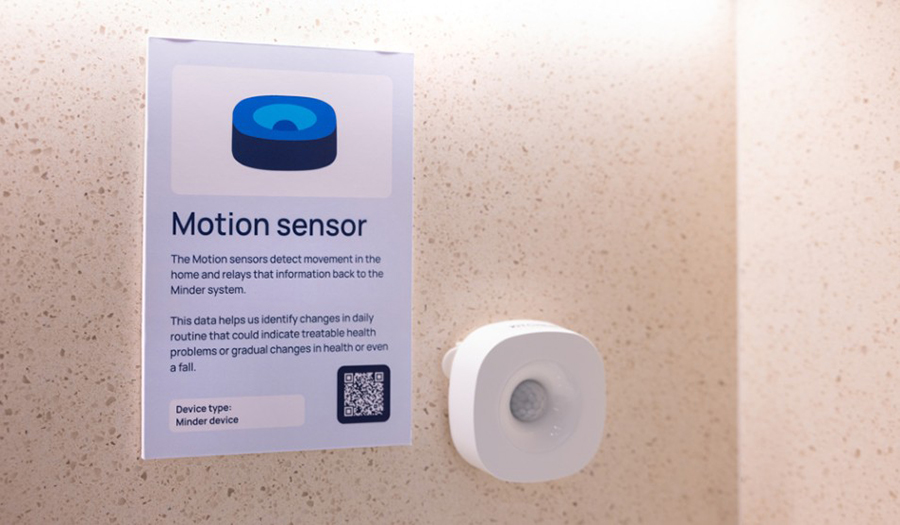Imperial College Healthcare NHS Trust has launched a new NHS service for people with dementia, offering remote, at-home monitoring that provides specialist support.
It is hoped the service can lead to more appropriate interventions and earlier treatments.
MinderCare uses a network of sensors installed in the home to send data back to a dedicated team of doctors, nurses, and other clinical specialists. This team use the information to better understand how the person is managing their daily routine, provide tailored advice, and identify early signs of changing health and care needs which may help reduce unnecessary hospital admissions.
This new service provides access to a cutting-edge technology system, informed by over 10 years of NHS research and underpinned by clinical care and support, including infrastructure support from the NIHR Imperial Biomedical Research Centre.
The MinderCare service model has been developed by researchers at the UK Dementia Research Institute (UK DRI) Care Research & Technology Centre at Imperial College London and is led by Professor David Sharp, in partnership with clinical teams at Imperial College Healthcare NHS Trust and Surrey and Borders Partnership NHS Foundation Trust.
MinderCare has been funded and supported by the not-for-profit medical research charity LifeArc.
MinderCare aims to enhance the quality of life for people with dementia and their families, by offering medical teams access to data that could help maintain independence for longer for many by identifying areas they may need more support with. This can also provide reassurance for families and friends.
The person with dementia is provided with a network of smart home devices which are connected via the internet and installed in their home. It includes door, appliance, and movement sensors, which can capture trends in movement around the home and during basic household tasks, such as making a cup of tea.
There is also a bed mat, which sits under the mattress, tracking sleep disturbances, detecting movement, and measuring breathing and heart rates. None of the devices record sound or video, maintaining the individual’s privacy, and they have a discreet design to avoid interfering with daily life.
Data is reviewed every day by the MinderCare monitoring team, which has been sent from the individual’s home system directly to the Minder platform – a secure digital research platform which analyses information from the various devices to provide detailed insight. This integrated data helps the monitoring team identify any trends or patterns that might indicate a health and care need so that it can be escalated quickly for further review and intervention if required.
Examples of how the sensors can be used to provide valuable data include detecting potential respiratory infections via the bed mat sensor through changes in heart or respiratory rates, identifying unusual habits of movement like leaving the house in the middle of the night, and managing medication and ensuring the right dosage for disrupted sleep and nighttime restlessness by tracking the person’s response to medication.
Professor Sharp said: “We need to develop new ways to care for people living with dementia. New technologies can support our existing dementia services to provide more responsive and personalised care.
“MinderCare is an exciting partnership between the UK Dementia Research Institute and Imperial College NHS Healthcare Trust that trials a radically new way of dementia care that is anchored in the hospital but reaching out into peoples homes, with the aim of delivering cost-effective care that improves quality of life and reduces hospital admissions.”
The new NHS service is run by nurse consultant and dementia specialist Jo James, who has been part of the academic collaboration with the NHS from the outset. Jo and her team support patients living with dementia.
She said the new system will be life-changing for families: “MinderCare promises to address the gaps between services that people living with dementia often experience.
“The MinderCare service model has been designed to provide continuity of care and personalised support for people that we know struggle to navigate health and care services on their own. The technology allows us to do this remotely for more people that we could otherwise reach.
“The AI enabled risk notifications and data insight provide the prompts and context for the clinical team to make timely contact with a specific focus – and of course patients and their families are also able to contact the team directly when they feel the need for advice, support or reassurance from a specialists in dementia care.”
The MinderCare team are based in the North West London Virtual Hospital at St Charles Hospital, where they are part of a wider team who provide remote monitoring and virtual ward services across North West London.
Jan Amade Cassimo is a specialist dementia nurse from the trust who has been seconded to support the MinderCare service. She has assessed over 60 patients and continues to receive new referrals every day.
“We have been very encouraged by the response so far,” Jan explained: “Referrals have come from GPs, geriatricians, case managers and other healthcare professions in the community, as well as hospital teams who have identified people going home with some anxiety about how they will manage. We have been able to offer a point of contact for many patients and their families already.”
The new NHS service will aim to enrol 100 patients by September 2025, as part of a study establishing the feasibility of continuing and expanding the service within North West London.
The post NHS trust installs innovative smart sensors in people with dementia’s homes to reduce hospital admissions appeared first on AT Today – Assistive Technology.

